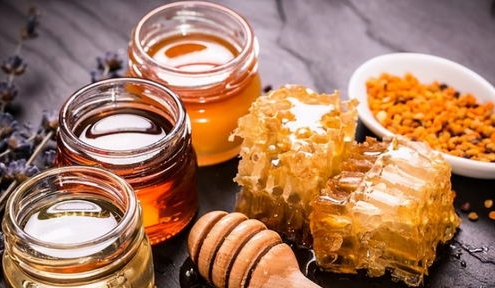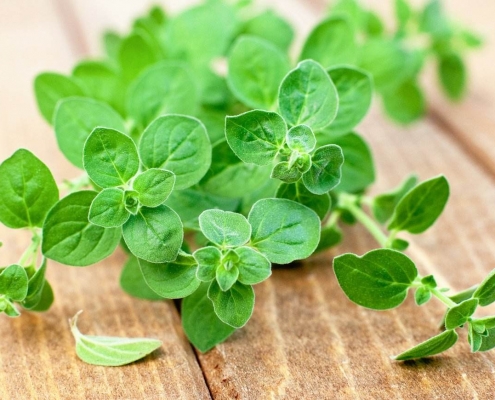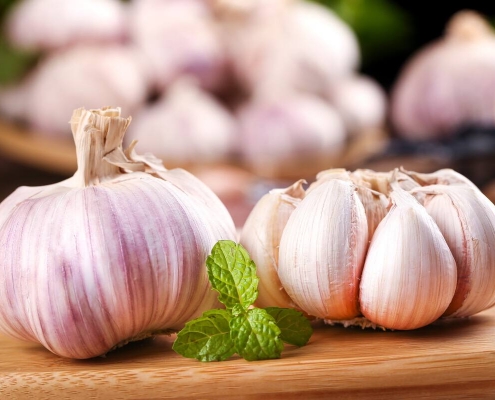Herbs are naturally occurring substances that act as natural antibiotics. These compounds are found in plants around their root systems. Bacteriophages infect bacteria and they communicate rapidly with each other, sharing survival traits and causing infections. This is why many foods and herbs are natural antibiotics, which can be effective for the prevention and treatment of various kinds of infections, including common cold. A few examples of such foods and herbs are garlic, honey, onions, licorice root, ginger, sage, echinacea and turmeric, today we will introduce the widely used natural antibiotic here.
Honey
Honey is one of the oldest known food-based antibiotics and dates back to ancient Israel and Egypt. Swedish scientists have discovered that honey contains not only a small amount of hydrogen peroxide (a powerful oxidant used to disinfect wounds and the environment, as well as food) but also 13 unique groups of lactic acid bacteria that can inhibit a variety of bacterial infections. These include deadly bacteria like METHicillin-resistant Staphylococcus aureus, Pseudomonas aeruginosa, and vancomycin-resistant enterococcus, all of which are so resistant that they can’t be stopped by normal treatments, except honey.
Oregon Oil
Oregano is considered a powerful natural antibiotic, and studies have shown it can even fight a strain of super Staphylococcus aureus (MRSA) that currently does not respond to any antibiotics. The main chemical components of oregano oil are carvainol and thymol, which belong to phenolic essential oils and have strong antibacterial and antioxidant effects. The extracts from oregano can be mixed with water or coconut oil to make a syrup. The amount of the herb should be determined by the type of infection that the patient has. A small amount taken once or twice a day can be very effective. It is important to select therapeutic-grade oregano oil. You should also check with your doctor if your current medications will interfere with its effects. It is best to consult a medical professional before taking any herbal antibiotic.
You can mix oregano oil with water or coconut oil for an oral antibiotic. If the infection is severe, you can use it unfermented, but it is not recommended for life-threatening emergencies. If you have a mild or moderate infection, it can be used as a homeopathic medicine. When mixed with water or coconut oil, oregano oil can be used to treat many types of infections, including the common cold.
Cranberry
There are several herbs that fight bacteria and viruses. Cranberry extract is often used for urinary tract infections and is an effective remedy for infections in the bladder. In addition to these, cranberry and aloe vera are helpful in treating other kinds of infections. A few herbs are also used in teas and tinctures. Depending on the herb, you may want to consult your doctor before using a natural antibiotic.
Echinacea
Echinacea extracts include many active components such as echinacea glucoside, chicory acid, mulacin, chlorogenic acid, caffeic acid, echinacea polysaccharide, flavonoids and a small amount of volatile oil. Studies have shown that different extracts of echinacea have immune-enhancing, anti-oxidation, anti-virus, anti-tumor and apoptosis regulation effects. Echinacea has become a popular immune stimulant in Europe and America because of its outstanding immune function, antibacterial, anti-inflammatory and antiviral effects. It is one of the few medicinal plants widely used for natural antibiotic in the world so far. A good echinacea extract can be taken topically to treat a urinary tract infection.
Garlic
Garlic is not only a good condiment but also a purely natural antiseptic. According to research, garlic contains about 2% allicin, which has a very good inhibition and killing effect for cold, tuberculosis bacilli, and vibrio cholerae, its bactericidal ability is equivalent to penicillin 1/10, known as “natural antibiotics”. Garlic extract can also help fight the common cold and other infections, as well as fight MRSA.
Herbs that fight viruses also include goldense, barberry, lomatium and so on, in addition to their antibiotic properties, they are also known to have antibacterial properties. Unlike pharmaceutical medicines, herbal medicines do not cause side effects and are often considered safe and effective. Some of these herbs are useful for treating minor infections, such as the common cold. Herbs can also be a great option for boosting the immune system. For a more powerful effect, you can even combine a few different kinds of natural remedies together.
The herbal extracts have medicinal properties and can be taken in capsule, tincture, or powder form. The dosage for a particular herb depends on the condition that it treats, but many of these herbs are considered antibiotics. When used correctly, they can help with preventing the onset of serious illnesses. The most effective way to use them is to take them before eating. You can dilute them with water if they are too strong for you. If you are not sure whether to use herbs to prevent infection, it’s recommended that you consult a doctor first.
- Dandelion Extract: What It Is, Benefits, Uses and Side Effect - April 23, 2024
- Is Berberine Extract Help For Weight Loss? - April 11, 2024
- Why Is Pysllium Husk Powder A Popular Meal Replacement Ingredient? - April 3, 2024






